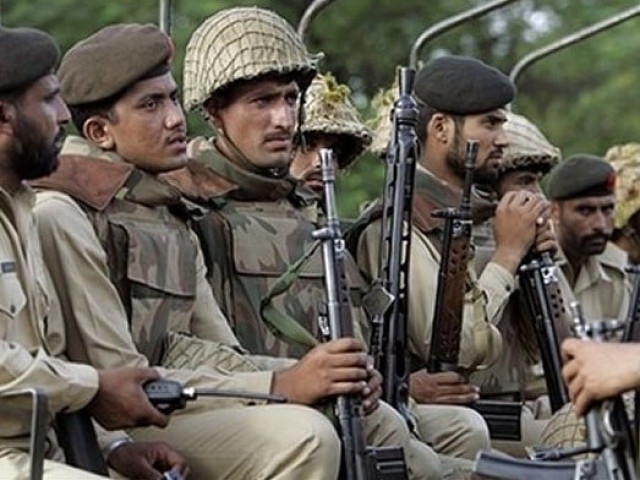You shouldn’t use bits of Islam to raise military discipline, morale and so on. I’m sorry to say that this is the way it has always been used in the Pakistani army. It is our equivalent of rum – the generals use it to get their men to launch suicidal attacks. But there is no such thing as a powerful jihadi group within the army. Of course, there are many devoutly Muslim officers and jawans, but at heart he vast majority of the army are nationalists, and take whatever is useful from Islam to serve what they see as Pakistan’s interests. The Pakistani army has been a nationalist army with an Islamic look.
In the 1980s, General Zia did undertake measures to make the army more Islamic, and a good many officers who wanted promotion adopted an Islamic façade in the hope of furthering this. Zia also encouraged Islamic preaching within the army, notably by the Tabligh-e-Jamaat. However, as the careers of the Generals Karamat and Musharraf indicate, this did not lead to known secular generals being blocked from promotion in the 1990s, and especially under Musharraf, most of Zia’s measures were rolled back.
In recent years, preaching by the Tabligh has been strongly discouraged, not so much because of political fears (the Tabligh is determinedly apolitical) as because of instinctive opposition to any groups that might encourage factions among officers, and loyalties to anything other than the Army itself.
However, if the Army is not Islamist, its members can hardly avoid sharing in the bitter hostility to US policy of the overwhelming majority of the Pakistani population. To judge by retired and serving officers of my acquaintance, this includes the genuine conviction that either the Bush administration or Israel were responsible for 9/11. Inevitably therefore, there was deep opposition throughout the Army after 2001, to US pressure to crack down on the Afghan Taliban and their Pakistani sympathizers. “We are being ordered to launch a Pakistani civil war for the sake of America”, an officer told me in 2002. “Why on earth should we? Why should we commit suicide for you?”
In 2007-2008, this was beginning to cause serious problems of morale. The most dangerous single thing I heard during my visits to Pakistan in those years was that soldiers’ families in villages in the NWFP and the Potwar region were finding it increasingly difficult to find high-status brides for their sons serving in the military, because of the growing popular feeling that “the Army are slaves of the Americans”, and “the soldiers are killing fellow Muslims on America’s orders.”
By late 2009 the sheer number of soldiers killed by the Pakistani Taliban and their allies, and still more importantly the increasingly murderous and indiscriminate Pakistani Taliban attacks on civilians, seems to have produced a change of mood in the areas of military recruitment. Nonetheless, if the Pakistani Taliban are increasingly unpopular, that does not make the US any more popular; and if the US ever put Pakistani soldiers in a position where they felt that honour and patriotism required them to fight America, many would be willing to do so.
The most dangerous moment in my visits to Pakistan since 9/11 came in August-September 2008, when on two occasions US forces entered Pakistan’s tribal areas on the ground in order to raid suspected Taliban and al Qaeda bases. On the second occasion, Pakistani soldiers fired in the air to turn the Americans back. On September 19 2008 the Chief of the Army Staff, General Kayani, flew to meet the US Chief of the Joint Staffs, Admiral Mike Mullen, on the US Aircraft Carrier USS Abraham Lincoln, and in the words of a senior Pakistani general “gave him the toughest possible warning about what would happen if this were repeated."
Pakistani officers from Captain to Lt General have told me that the entry of US ground forces into Pakistan in pursuit of the Taliban and al Qaeda is by far the most dangerous scenario as far as both Pakistani-US relations and the unity of the Army is concerned. As one retired general explained, drone attacks on Pakistani territory, though the ordinary officers and soldiers find them humiliating, are not a critical issue because they cannot do anything about them.
US ground forces inside Pakistan are a different matter, because the soldiers can do something about them. They can fight. And if they don’t fight, they will feel utterly humiliated, before their wives, mothers, children. It would be a matter of honour, which as you know is a tremendous thing in our society. These men have sworn an oath to defend Pakistani soil. So they would fight. And if the generals told them not to fight, many of them would mutiny, starting with the Frontier Corps.
At this point, not just Islamist radicals but every malcontent in the country would join the mutineers, and the disintegration of Pakistan would come a giant leap closer.
Traditionally, hostility to the US in Pakistan has stemmed from a mixture of anger at US policies in the Muslim world more widely (especially of course concerning Israel and Palestine) and a feeling that on specific occasions, the US has used and then abandoned Pakistan. More recently, however, hostility has been considerably strengthened by the growing alliance between the US and India. This is especially dangerous as far as the military is concerned, for fear of India is the military’s central raison d’etre.



COMMENTS
Comments are moderated and generally will be posted if they are on-topic and not abusive.
For more information, please see our Comments FAQ